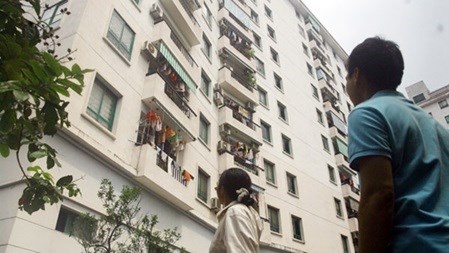Gov't seeks housing to reach more buyers
Sunday, 19:08, 17/01/2016
Deputy Prime Minister Vu Van Ninh has urged the Ministry of Construction to implement policies that would make social housing projects more accessible to low-income buyers.
"Social housing projects are developed but it is important now that they reach buyers," Ninh said at the ministry's conference on January 15.
At the conference, Ninh said he was impressed with the result of the restructuring of the property market with the improved legal framework and a five-year high growth rate of the construction sector.
The ministry's report showed that between 2011 and 2015, around 780,000 social housing apartments were put into use, providing accommodation for more than three million low-income earners.
As of the end of December 2015, average housing space reached 22 sq.m per head, up 1.1 sq.m against 2014.
The disbursement of the VND30 trillion (US$1.34 billion) support package was speeded up, with 90% of the sum committed to be loaned and 59% disbursed.
The production value of the construction sector reached VND974 trillion (US$43.45 billion), up more than 11% against last year.
"The construction sector contributed largely to the country's macro stabilisation, inflation control and economic growth," Ninh said.
Still, Ninh said that the construction ministry must enhance planning quality, and stressed that planning must have a long-term vision. In addition, the management must ensure that construction strictly follows planning.
He urged the ministry to boost the restructuring and privatisation of its member enterprises, including Song Thao and Ha Long cement plants, divestment from non-core businesses, while improving public services and preventing waste.
Minister of Construction Trinh Dinh Dung said that the ministry would aim at enhancing the property product quality this year as the competitiveness of the construction sector remained low due to poor quality and stagnant progress.
This was one among the efforts to achieve the goals set for the construction sector in 2016, including boosting the construction production value by 10% against 2015, increasing average housing space per head to 22.6% and ensuring an urbanisation rate of 36.8%.
The administrative reform would also be sped up to create favourable investment conditions for enterprises and home buyers.
This was in addition to the continuing efforts to improve the legal framework, enhancing supervision, and removing difficulties for the property market in line with the national housing development strategy.
The minister said that the bottlenecks in developing social housing projects were difficult credit and land access, and low profit for developers.
At the conference, Minister Dung, once again, stressed that the property market at the moment did not have adequate factors which would form a bubble. "However, it cannot be ignored."
He said the ministry would not let the market become overheated, and go out of control.
At the conference, Ninh said he was impressed with the result of the restructuring of the property market with the improved legal framework and a five-year high growth rate of the construction sector.
The ministry's report showed that between 2011 and 2015, around 780,000 social housing apartments were put into use, providing accommodation for more than three million low-income earners.
As of the end of December 2015, average housing space reached 22 sq.m per head, up 1.1 sq.m against 2014.
The disbursement of the VND30 trillion (US$1.34 billion) support package was speeded up, with 90% of the sum committed to be loaned and 59% disbursed.
 |
The production value of the construction sector reached VND974 trillion (US$43.45 billion), up more than 11% against last year.
"The construction sector contributed largely to the country's macro stabilisation, inflation control and economic growth," Ninh said.
Still, Ninh said that the construction ministry must enhance planning quality, and stressed that planning must have a long-term vision. In addition, the management must ensure that construction strictly follows planning.
He urged the ministry to boost the restructuring and privatisation of its member enterprises, including Song Thao and Ha Long cement plants, divestment from non-core businesses, while improving public services and preventing waste.
Minister of Construction Trinh Dinh Dung said that the ministry would aim at enhancing the property product quality this year as the competitiveness of the construction sector remained low due to poor quality and stagnant progress.
This was one among the efforts to achieve the goals set for the construction sector in 2016, including boosting the construction production value by 10% against 2015, increasing average housing space per head to 22.6% and ensuring an urbanisation rate of 36.8%.
The administrative reform would also be sped up to create favourable investment conditions for enterprises and home buyers.
This was in addition to the continuing efforts to improve the legal framework, enhancing supervision, and removing difficulties for the property market in line with the national housing development strategy.
The minister said that the bottlenecks in developing social housing projects were difficult credit and land access, and low profit for developers.
At the conference, Minister Dung, once again, stressed that the property market at the moment did not have adequate factors which would form a bubble. "However, it cannot be ignored."
He said the ministry would not let the market become overheated, and go out of control.
